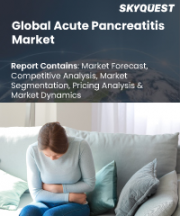
|
시장보고서
상품코드
1789843
급성 췌장염 시장 : 세계 및 지역별 - 분석과 예측(2025-2035년)Acute Pancreatitis Market - A Global and Regional Analysis: Analysis and Forecast, 2025-2035 |
||||||
급성 췌장염은 췌장의 갑작스러운 염증으로 담석이나 알코올 과다 섭취가 원인인 경우가 많습니다.
이 증상은 심한 복통, 메스꺼움, 구토를 유발하고 경우에 따라서는 장기부전이나 쇼크와 같은 전신 합병증을 유발할 수 있습니다. 즉시 치료하지 않으면 심각한 급성 췌장염으로 진행되어 다발성 장기부전, 감염 등의 합병증으로 사망 위험이 높아집니다. 급성 췌장염 세계 시장은 약물 치료, 조기 진단, 지지요법의 발전으로 환자 예후가 개선됨에 따라 확대되고 있습니다. 기존에는 급성 췌장염을 관리하기 위해 수액 주입, 통증 관리, 영양 공급 등의 지지요법을 시행해 왔습니다. 그러나 염증, 효소 억제, 장기 보호를 표적으로 하는 새로운 약물 요법이 치료의 전망을 바꾸고 있습니다.
급성 췌장염 치료제 시장은 담석증, 음주, 비만 증가로 인한 전 세계 췌장염 발병률 증가 등 여러 요인에 의해 주도되고 있습니다. 또한 췌장 괴사, 감염, 장기부전 등의 합병증 예방을 위한 보다 효과적인 치료법의 필요성에 대한 인식도 높아지고 있습니다.
급성 췌장염 시장의 주요 촉진요인 중 하나는 비만, 담석, 알코올 남용과 같은 위험 요인의 유병률이 증가하고 있으며, 이는 췌장염 발병률 증가에 기여하고 있습니다. 급성 췌장염 치료를 찾는 환자가 증가함에 따라 질병의 중증도를 줄이고 회복을 개선하며 중증 췌장염으로의 진행을 예방할 수 있는 의학적 개입에 대한 수요가 증가하고 있습니다. 염증 반응에 관여하는 주요 사이토카인과 경로를 표적으로 하는 항염증약는 급성 췌장염의 중증도를 낮추고, 췌장 괴사나 감염 등의 합병증을 예방하는 데 필수적인 역할을 하고 있습니다.
급성기 치료 외에도 췌장 보호 및 장기부전 완화를 목적으로 하는 약물도 주목받고 있습니다. 췌장 효소 억제제와 사이토카인 억제제가 중요한 치료 옵션으로 떠오르고 있으며, 췌장내 효소 활성화로 인한 유해한 영향을 줄이고 전신 염증을 예방하는 데 도움을 주고 있습니다. 이들 치료제는 급성 췌장염의 관리와 장기적인 합병증 최소화에 중요한 역할을 할 것으로 기대되며, 시장을 더욱 확대할 것으로 예측됩니다.
또한 조기 진단 툴와 면역 조절 요법의 발전이 시장 확대에 기여하고 있습니다. 중증 췌장염을 조기에 발견할 수 있는 바이오마커와 영상 기술의 개발로 보다 적시에 적절한 개입이 가능해져 환자의 예후를 개선할 수 있습니다. 면역 조절과 조직 복구에 초점을 맞춘 초기 단계의 질병을 타겟으로 하는 의약품은 질병의 진행을 억제할 수 있는 새로운 대안을 제공함으로써 시장 확대를 더욱 가속화할 것으로 기대됩니다.
급성 췌장염 시장의 유망 성장에도 불구하고 혁신적인 치료법의 높은 비용, 자원이 제한된 환경에서는 환자 접근성이 제한될 수 있다는 점 등 여러 가지 과제가 남아있습니다. 또한 급성 췌장염의 치료는 복잡하므로 전문적인 치료가 필요하며, 효소억제제나 항염증약 등의 치료에 대한 환자 반응의 편차가 지속적으로 문제점으로 지적되고 있습니다. 그러나 항염증약, 면역조절제, 효소 표적치료제의 연구개발이 진행되고 있으며, 급성 췌장염의 관리를 개선하고 시장을 성장시킬 수 있는 큰 기회가 되고 있습니다.
급성 췌장염 시장은 꾸준히 성장하고 있으며, 주요 기업은 혁신적인 치료법, 조기 진단, 첨단 약물전달 시스템에 중점을 두고 경쟁 우위를 확보하기 위해 다양한 전략을 채택하고 있습니다.
급성 췌장염 시장은 빠르게 진화하고 있으며, 몇 가지 주요 동향이 성장을 주도하고 있습니다. 그 중 하나가 항염증 치료제 개발로, 급성 췌장염의 기저에 있는 염증에 대한 대처를 각 사가 모색하고 있습니다. 또 다른 주요 동향은 치료의 효과와 안전성을 향상시키는 첨단 약물전달 시스템의 개발입니다. 마지막으로 재활과 회복 치료에 대한 관심이 높아지고 있습니다. 이러한 추세는 급성 췌장염 시장에서 급성기 관리와 장기적인 회복을 개선하기 위해 보다 타겟팅되고 개별화된 종합적인 치료 접근법으로의 전환을 보여줍니다.
세계의 급성 췌장염 시장에 대해 조사했으며, 시장의 개요와 지역별 동향 및 시장에 참여하는 기업의 개요 등을 제공하고 있습니다.
목차
개요
제1장 세계의 급성 췌장염 시장 : 업계 전망
- 시장 개요
- 급성 췌장염의 역학적 분석
- 규제 상황
- 주요 동향
- 임상시험 분석
- 시장 역학
- 영향 분석
- 시장 성장 촉진요인
- 시장 억제
- 시장 기회
제2장 급성 췌장염 세계 시장(지역별, 100만 달러, 2023-2035년)
- 북미
- 유럽
- 아시아태평양
제3장 경쟁 구도와 기업 개요
- 경쟁 구도
- 주요 전략과 개발
- 기업 개요
- CalciMedica, Inc.
- Arrivo BioVentures LLC
- Lamassu Pharma, LLC.
- Dr. Falk Pharma GmbH
제4장 조사 방법
KSA 25.08.20Global Acute Pancreatitis Market, Analysis and Forecast: 2025-2035
Acute pancreatitis is a sudden inflammation of the pancreas, often caused by gallstones or excessive alcohol consumption. The condition can lead to severe abdominal pain, nausea, vomiting, and in some cases, systemic complications such as organ failure and shock. If not treated promptly, it can progress to severe acute pancreatitis, which carries a high risk of mortality due to complications such as multi-organ failure and infection. The global market for acute pancreatitis is growing as advancements in pharmaceutical therapies, early diagnosis, and supportive care are improving patient outcomes. Traditionally, the management of acute pancreatitis involved supportive care such as intravenous fluids, pain management, and nutritional support. However, new drug therapies targeting inflammation, enzyme inhibition, and organ protection are transforming the treatment landscape.
The market for pharmaceutical treatments in acute pancreatitis is driven by several factors, including the increasing incidence of pancreatitis globally, especially due to rising rates of gallstones, alcohol consumption, and obesity. There is also a growing recognition of the need for more effective therapies aimed at preventing complications, such as pancreatic necrosis, infection, and organ failure.
One of the main drivers for the acute pancreatitis market is the increasing prevalence of risk factors such as obesity, gallstones, and alcohol abuse, which are contributing to a higher incidence of the condition. As more patients seek treatment for acute pancreatitis, there is a rising demand for pharmaceutical interventions that can reduce the severity of the disease, improve recovery, and prevent the progression to severe pancreatitis. Anti-inflammatory drugs that target key cytokines and pathways involved in the inflammatory response are becoming essential in reducing the severity of acute pancreatitis and preventing complications like pancreatic necrosis and infections.
In addition to acute care treatments, drugs aimed at protecting the pancreas and mitigating organ failure are gaining attention. Pancreatic enzyme inhibitors and cytokine inhibitors are emerging as important therapeutic options, helping to reduce the harmful effects of enzyme activation within the pancreas and preventing systemic inflammation. These therapies are expected to play a crucial role in managing acute pancreatitis and minimizing long-term complications, further expanding the market.
Moreover, advancements in early diagnostic tools and immunomodulatory therapies are contributing to market growth. The development of biomarkers and imaging technologies for the early detection of severe pancreatitis allows for more targeted and timely interventions, improving patient outcomes. Pharmaceuticals that target the early stages of the disease, focusing on immunomodulation and tissue repair, are expected to further accelerate market expansion, providing new options to reduce disease progression.
Despite the promising growth of the acute pancreatitis market, challenges remain, including the high cost of innovative treatments, which may limit access for patients in resource-limited settings. The complexity of treating acute pancreatitis also requires specialized care, and variability in patient responses to treatments such as enzyme inhibitors or anti-inflammatory agents continues to be a challenge. However, ongoing research and development in anti-inflammatory, immunomodulatory, and enzyme-targeted therapies provide significant opportunities for market growth and improving the management of acute pancreatitis.
The acute pancreatitis market is experiencing steady growth, with key players adopting various strategies to gain a competitive edge, focusing on innovative therapies, early diagnosis, and advanced drug delivery systems.
The acute pancreatitis market is evolving rapidly, with several key trends driving its growth. One of the main focuses is on the development of anti-inflammatory therapies, as companies seek to address the inflammation that underpins acute pancreatitis. Another key trend is the development of advanced drug delivery systems that improve the efficacy and safety of treatments. Lastly, there is an increasing focus on rehabilitation and recovery therapies. Together, these trends indicate a shift toward more targeted, personalized, and comprehensive treatment approaches, aiming to improve both acute management and long-term recovery outcomes in the acute pancreatitis market.
Table of Contents
Executive Summary
Scope and Definition
Market/Product Definition
Key Questions Answered
Analysis and Forecast Note
1. Global Acute Pancreatitis Market: Industry Outlook
- 1.1 Market Overview
- 1.2 Epidemiological Analysis of Acute Pancreatitis
- 1.3 Regulatory Landscape
- 1.4 Key Trends
- 1.5 Clinical Trial Analysis
- 1.6 Market Dynamics
- 1.6.1 Impact Analysis
- 1.6.2 Market Drivers
- 1.6.3 Market Restraint
- 1.6.4 Market Opportunities
2. Global Acute Pancreatitis Market, by Region, $Million, 2023-2035
- 2.1 North America
- 2.1.1 Market Dynamics
- 2.1.2 Market Sizing and Forecast
- 2.1.2.1 North America Acute Pancreatitis Market, by Country
- 2.1.2.1.1 U.S.
- 2.1.2.1 North America Acute Pancreatitis Market, by Country
- 2.2 Europe
- 2.2.1 Market Dynamics
- 2.2.2 Market Sizing and Forecast
- 2.2.2.1 Europe Acute Pancreatitis Market, by Country
- 2.2.2.1.1 Germany
- 2.2.2.1.2 U.K.
- 2.2.2.1.3 France
- 2.2.2.1.4 Italy
- 2.2.2.1.5 Spain
- 2.2.2.1 Europe Acute Pancreatitis Market, by Country
- 2.3 Asia-Pacific
- 2.3.1 Market Dynamics
- 2.3.2 Market Sizing and Forecast
- 2.3.2.1 Asia-Pacific Acute Pancreatitis Market, by Country
- 2.3.2.1.1 Japan
- 2.3.2.1 Asia-Pacific Acute Pancreatitis Market, by Country
3. Competitive Landscape and Company Profiles
- 3.1 Competitive Landscape
- 3.1.1 Key Strategies and Developments
- 3.1.1.1 Funding Activities
- 3.1.1.2 Mergers and Acquisitions
- 3.1.1.3 Regulatory Approvals
- 3.1.1.4 Partnerships, Collaborations and Business Expansions
- 3.1.1 Key Strategies and Developments
- 3.2 Company Profiles
- 3.2.1 CalciMedica, Inc.
- 3.2.1.1 Overview
- 3.2.1.2 Product Portfolio
- 3.2.1.3 Target Customers
- 3.2.1.4 Key Personnel
- 3.2.1.5 Analyst View
- 3.2.2 Arrivo BioVentures LLC
- 3.2.2.1 Overview
- 3.2.2.2 Product Portfolio
- 3.2.2.3 Target Customers
- 3.2.2.4 Key Personnel
- 3.2.2.5 Analyst View
- 3.2.3 Lamassu Pharma, LLC.
- 3.2.3.1 Overview
- 3.2.3.2 Product Portfolio
- 3.2.3.3 Target Customers
- 3.2.3.4 Key Personnel
- 3.2.3.5 Analyst View
- 3.2.4 Dr. Falk Pharma GmbH
- 3.2.4.1 Overview
- 3.2.4.2 Product Portfolio
- 3.2.4.3 Target Customers
- 3.2.4.4 Key Personnel
- 3.2.4.5 Analyst View
- 3.2.1 CalciMedica, Inc.



















